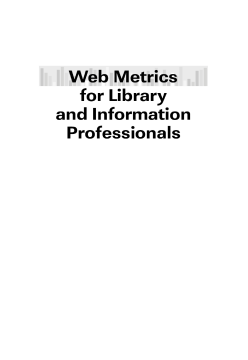
Additional Information
Book Details
Abstract
A practical guide to using web metrics to measure impact and demonstrate value.
The web provides an opportunity to collect a host of different metrics, from those associated with social media accounts and websites to more traditional research outputs. This book is a clear guide for library and information professionals as to what web metrics are available and how to assess and use them to make informed decisions and demonstrate value. As individuals and organizations increasingly use the web in addition to traditional publishing avenues and formats, this book provides the tools to unlock web metrics and evaluate the impact of this content.
Key topics covered include:
- Introduction to web metrics
- Bibliometrics, webometrics and web metrics
- Data collection tools
- Evaluating impact on the web
- Evaluating social media impact
- Investigating relationships between actors
- Exploring traditional publications in a new environment
- Web metrics and the web of data
- The future of web metrics and the library and information professional.
Dr David Stuart is a researcher in the Centre for e-Research (CERCH) at King’s College London, and an honorary research fellow in the Statistical Cybermetrics Research Group at the University of Wolverhampton, where he was previously Web 2.0 Research Fellow. He has a PhD in information science and regularly writes about library and information science topics for professional journals and magazines. His previous book Facilitating Access to the Web of Data was published by Facet Publishing in 2011.
A practical guide to using web metrics to measure impact and demonstrate value. The web provides an opportunity to collect a host of different metrics, from those associated with social media accounts and websites to more traditional research outputs. This book is a clear guide for library and information professionals as to what web metrics are available and how to assess and use them to make informed decisions and demonstrate value. As individuals and organizations increasingly use the web in addition to traditional publishing avenues and formats, this book provides the tools to unlock web metrics and evaluate the impact of this content. Key topics covered include: • Introduction to web metrics • Bibliometrics, webometrics and web metrics • Data collection tools • Evaluating impact on the web • Evaluating social media impact • Investigating relationships between actors • Exploring traditional publications in a new environment • Web metrics and the web of data • The future of web metrics and the library and information professional. Readership: This book will provide a practical introduction to web metrics for a wide range of library and information professionals, from the bibliometrician wanting to demonstrate the wider impact of a researcher’s work than can be demonstrated through traditional citations databases, to the reference librarian wanting to measure how successfully they are engaging with their users on Twitter. It will be a valuable tool for anyone who wants to not only understand the impact of content, but demonstrate this impact to others within the organization and beyond.
Web Metrics for Library and Information Professionals by David Stuart (Researcher in the Centre for e-Research at King's College London) is a 192 page compendium that provides librarians with an informative and practical introduction to web metrics, bibliometrics, webometrics, and data collection tools. Web Metrics for Library and Information Professionals will enable librarians to evaluate social media impact, web impact, relationships between entities on the web; and explore traditional publications in a new cyberspace environment. Of special note is Stuart's commentary on the future of web metrics and the library professional. A seminal work of impressive scholarship, Web Metrics for Library and Information Professionals is very highly recommended for practising librarians in community, academic, corporate, and governmental library systems, as well as informational professionals charged with the responsibility for gathering, analyzing, interpreting, and reporting web metrics.
Midwest Book Review
Does Web Metrics for Library and Information Professionals provide a strong foundation for LIS professionals to explore the nature and potential of web metrics as a tool for building better web-based information services? The answer is unequivocally yes, and the book is recommended.
Archives and Manuscripts
...a very interesting book that covers a range of technical areas. For anyone interested in bibliometrics who wants to better understand how the web presents both challenges and opportunities to the information science community then this is a great introduction. The author is clearly knowledgeable about metrics and makes some useful connections between the applied and research worlds. Any information professional or student wanting a considered overview of some of the key metrics for providing information services in a digital world would be advised to read it.
Elucidate
